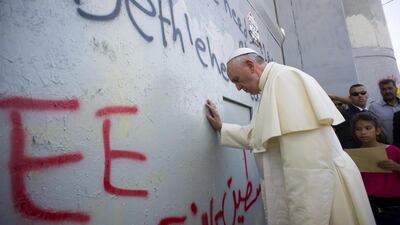BETHLEHEM, WEST BANK // Pope Francis came face to face with the daily reality of Palestinians on Sunday, even touching Israel’s separation wall, after calling for an end to the “increasingly unacceptable” Israeli-Palestinian conflict.
The Pope has said his visit to the Middle East has “purely religious” motives, but his spontaneous stop at the wall, where he rested his forehead against the barrier in prayer, was a show of support that Palestinians had been hoping for, weeks after the collapse of US-brokered peace talks with the Israelis.
In an unprecedented move, Pope Francis invited Palestinian president Mahmoud Abbas and Israeli president Shimon Peres to his home in the Vatican for a “heartfelt prayer” for peace.
“Building peace is difficult, but living without peace is a constant torment,” he said.
Mr Abbas accepted the invitation and planned to visit the Vatican on June 6. Mr Peres said he welcomed the invitation, but did not say if he would attend.
Pope Francis’s arrival in the West Bank marked the start of the second stage of his three-day tour, which began in Jordan on Saturday, aimed at easing an ancient rift with Orthodox Christians and speaking out in favour of regional peace.
“The time has come to put an end to this situation which has become increasingly unacceptable.”
Flanked by Mr Abbas at his official welcoming ceremony to the Palestinian territories, Pope Francis added: “The time has come for everyone to find the courage ... to forge a peace which rests on the acknowledgement by all of the right of two states to exist and to live in peace and security within internationally recognised borders.”
Mr Abbas raised the subject of Jerusalem, claimed both by Israel and the Palestinians as their capital, accusing Israel of “systematically acting to change its identity and character, and strangling the Palestinians, both Christians and Muslims, with the aim of pushing them out”.
Shortly afterwards, the “humble pope”, famed for his defence of the oppressed, halted his open jeep as his convoy passed near the separation wall in Bethlehem erected by the Israelis.
The Vatican admitted the stop was a surprise.
Dressed in his white cassock and flanked by anxious Palestinian security guards, he walked over to the eight-metre high concrete barrier, which is topped by a guard tower.
He rested his hand and forehead on the graffiti-daubed wall, pausing for several moments in front of a scrawled appeal for his help: “Pope we need someone to speak about justice.”
The stop came as the Pope was on his way to celebrate mass with 10,000 pilgrims in a packed and colourful Manger Square, next to the site Christians revere as the birthplace of Jesus.
The Pope then shared his lunch with several Palestinian families, before meeting refugee children at the entrance to Dheishe camp.
Israel began building a vast barrier through the West Bank in 2002 at the height of the second Palestinian intifada, or uprising, saying its construction was crucial for security.
But the Palestinians see the barrier, two-thirds of which is located inside the West Bank, as a land grab aimed at stealing part of their future state.
Pope Francis arrived in Tel Aviv to meet Mr Peres before continuing on to Jerusalem yesterday.
Arriving in Manger Square in Bethlehem, Francis was greeted by a choir singing the Christmas carol Angels from the Realms of Glory.
Catholic pilgrims had filed past security barriers into the square since dawn.
The scene was dominated by a stage where the pope celebrated mass, decked with huge Palestinian and Vatican flags and adorned with a giant tableau depicting the birth of Jesus.
The Vatican said the main reason for the visit was a meeting in Jerusalem with Bartholomew I, the Orthodox Patriarch of Constantinople, seeking to heal a nearly 1,000-year rift between the Orthodox and Roman Catholic churches.
Meanwhile, in Jerusalem, police arrested 26 Jewish extremists protesting at a site on Mount Zion where the Pope will celebrate mass on Monday.
* Agence France-Presse

